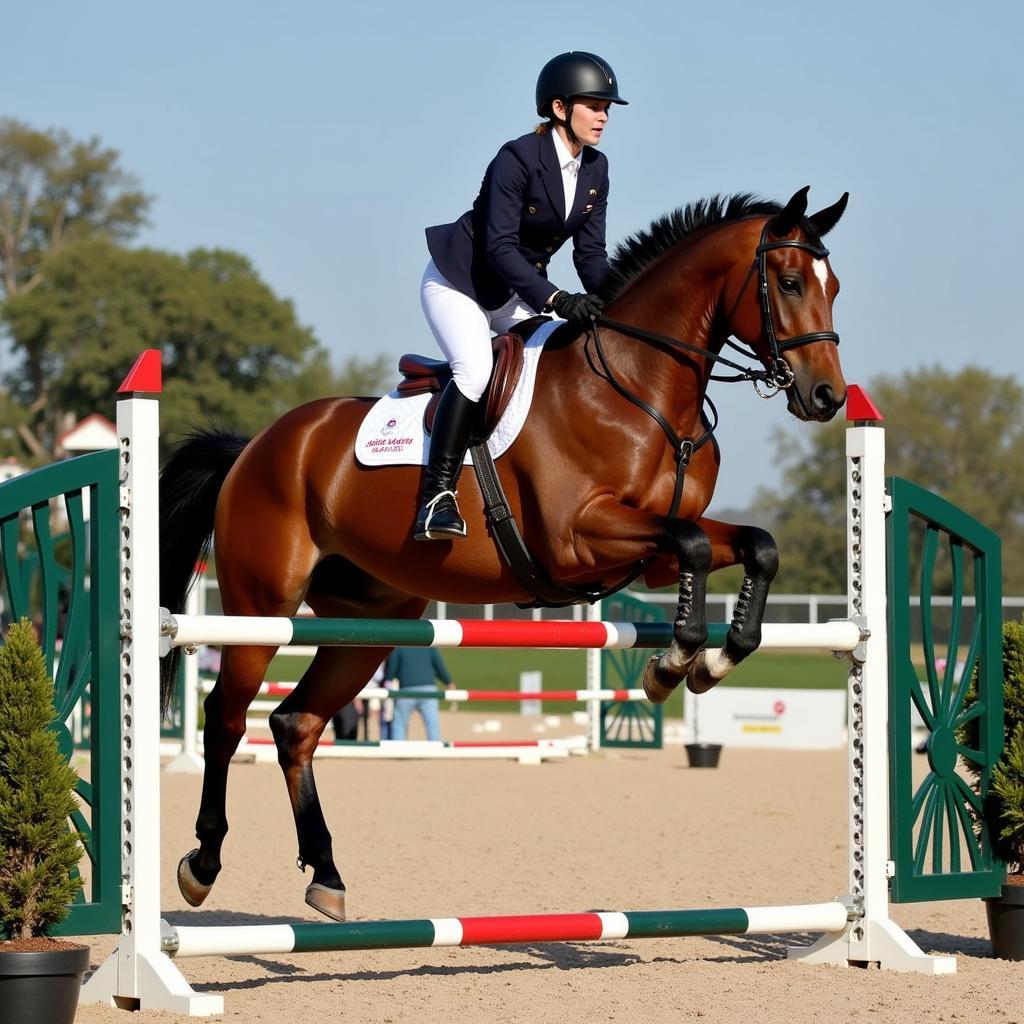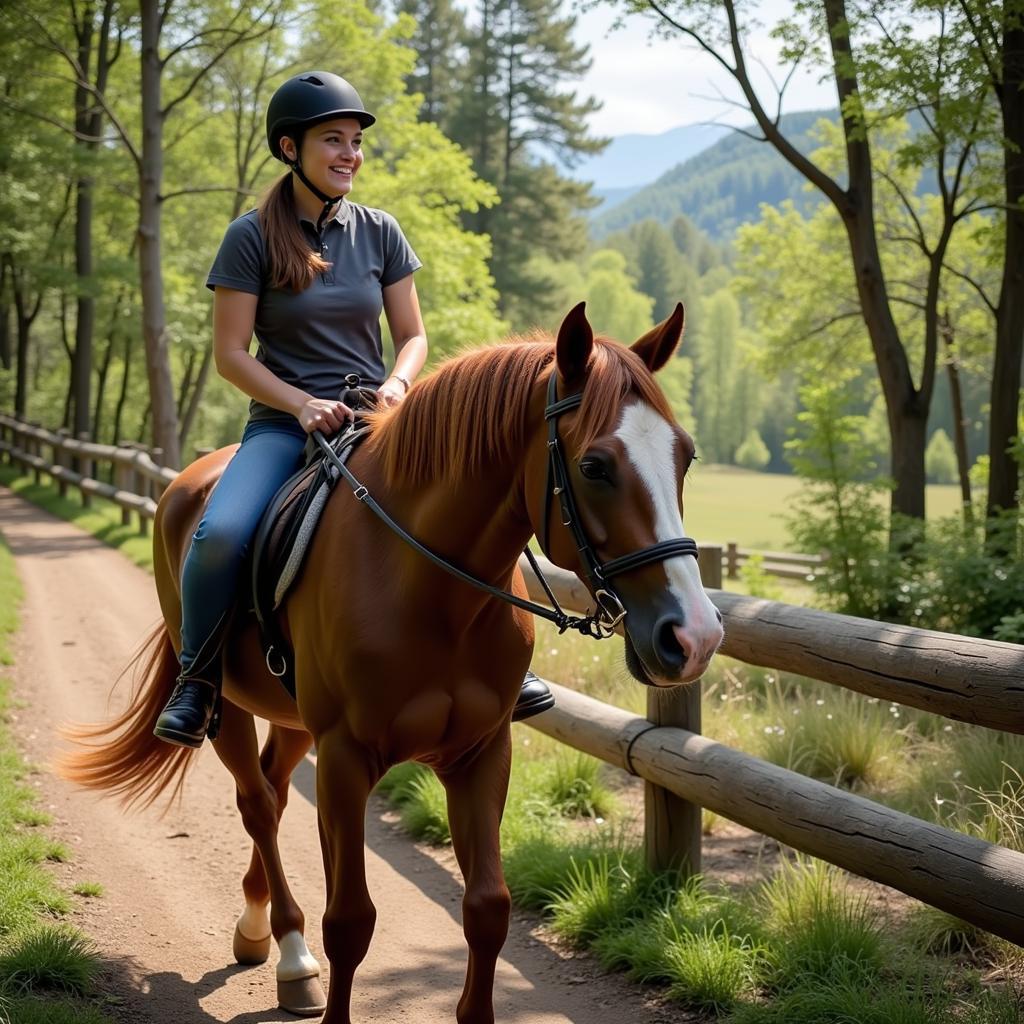Choosing the right horse is a pivotal decision, one that impacts not only your riding experience but also your safety and overall well-being. “Ride The Right Horse” isn’t just a catchy phrase, it’s the key to a fulfilling and successful equestrian journey. It’s about finding a horse whose temperament, training, and physical abilities align with your own skills, goals, and riding style.
Understanding “Ride the Right Horse”: More Than Just a Saying
“Ride the right horse” goes beyond simply choosing a horse that looks pretty. It’s about finding a partner that suits your individual needs. Are you a beginner rider looking for a calm and patient schoolmaster? Or are you an experienced competitor seeking a fiery athlete? The right horse can propel you forward, while the wrong one can lead to frustration, disappointment, and even danger. Choosing wisely is an investment in your future riding success. For novice riders, consider visiting a reputable riding school and trying out different horses under the guidance of an experienced instructor.
Matching Your Riding Style and Skill Level
Before you start searching for your perfect equine partner, take some time for self-reflection. Honestly assess your riding capabilities. Are you comfortable with all three gaits? Can you handle a spirited horse, or would you prefer a more laid-back mount? Do you dream of jumping high fences or leisurely trail rides? Defining your riding aspirations is essential in finding a horse that will help you achieve them. Remember, honesty is crucial; choosing a horse beyond your current skill level can be detrimental to both you and the horse. A horse’s temperament plays a crucial role in the riding experience, especially for beginners. For instance, a calm and predictable horse is ideal for a novice rider.
 Experienced Rider Jumping High Fences
Experienced Rider Jumping High Fences
Considering Temperament and Training
Temperament is perhaps the most crucial factor to consider when choosing a horse. A horse’s personality should complement yours. If you’re a laid-back rider, a high-strung horse might not be the best fit. Conversely, a timid rider might find a bolder horse intimidating. Look for a horse that is willing to cooperate, has a good work ethic, and isn’t easily spooked. Consider the horse’s training as well. A well-trained horse will be more responsive to your cues and make the learning process smoother for both of you. Buying quality rugged ride horse blankets can also contribute to your horse’s comfort and well-being. rugged ride horse blankets are designed to offer superior protection and durability.
Physical Considerations: Size and Soundness
“Ride the right horse” also means choosing a horse that is physically suited to you. Size and conformation matter. A horse that is too tall or too short can make it difficult to ride effectively and can even lead to physical strain. Ensure the horse is sound, meaning free from any lameness or physical limitations that could hinder its performance or cause discomfort. A pre-purchase veterinary exam is essential to confirm the horse’s overall health and soundness.
What are the Key Factors in Choosing the Right Horse?
Finding the right horse is a multifaceted process. Key factors to consider include your riding experience, the horse’s temperament and training, and the horse’s physical attributes. The horse’s size should be appropriate for your build, and its temperament should align with your personality. Consider the horse’s training level; a well-trained horse can make the riding experience significantly more enjoyable and safer.
How Do I Know if a Horse is the Right Fit for Me?
The best way to determine if a horse is a good fit is to spend time with it. Ride the horse multiple times in different environments. Observe its behavior and how it responds to your cues. Ask the current owner or trainer about the horse’s history, quirks, and any potential challenges. Trust your instincts. If something doesn’t feel right, it probably isn’t.
The Long-Term Commitment
Owning a horse is a significant commitment, both financially and emotionally. “Ride the right horse” also implies choosing a horse that you can realistically afford to care for. Consider the costs of feed, veterinary care, farrier services, and boarding. If you plan to compete, factor in the additional expenses associated with showing. Choosing the right spurs for horse riders can also improve communication and performance. spurs for horse riders are tools that require proper usage and understanding.
 Horse and Rider on Trail Ride
Horse and Rider on Trail Ride
Conclusion: A Partnership Built on Compatibility
“Ride the right horse” encompasses more than just physical ability; it’s about finding a partner whose personality and training complement yours. It’s about aligning your riding aspirations with a horse that can help you achieve them. It’s about a partnership built on trust, respect, and mutual understanding. Making the right choice will lead to a rewarding and enriching equestrian experience. Consider also the practical aspects of horse ownership, such as the cost of horse carriages. Understanding horse carriage prices can help you plan your budget effectively. Proper lighting in your riding arena is also essential. Explore our range of solar horse arena lights for an eco-friendly and cost-effective lighting solution.
FAQ
-
What if I can’t find the “right” horse? Don’t rush the process. It’s better to wait for the right horse than to settle for one that isn’t a good match.
-
How important is a pre-purchase exam? A pre-purchase exam is crucial to assess the horse’s health and suitability for your intended use.
-
Should I buy a horse for its looks? While appearance can be appealing, prioritize temperament, training, and soundness over aesthetics.
-
What if my riding skills improve? As your skills progress, you may eventually outgrow your horse. Be prepared to adjust your expectations or consider finding a more suitable mount.
-
What about getting toy horse wheels for children interested in horses? toy horse wheels can be a great way to introduce youngsters to the world of horses and spark their passion for riding.
Common Scenarios
-
Scenario 1: A beginner rider is drawn to a beautiful but spirited horse. While tempting, this might not be the best match. A calmer, more experienced horse would be a safer and more enjoyable choice.
-
Scenario 2: An experienced rider is looking for a horse to compete with. They should focus on finding a horse with the appropriate training, athleticism, and competitive temperament.
Further Exploration
Consider exploring articles on horse breeds, disciplines, and training techniques to further enhance your understanding.
Contact Us
For any assistance, reach out to us at Phone: 0772127271, Email: [email protected] Or visit us at QGM2+WX2, Vị Trung, Vị Thuỷ, Hậu Giang, Việt Nam. We have a 24/7 customer service team.